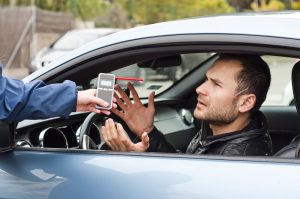
A PAS test is a roadside breath test that police may ask you to take if they suspect you of drunk driving. It stands for “Preliminary Alcohol Screening” test. This is a test you are asked to take before you have been arrested for DUI, and in most cases you are not required to take it—you can usually choose to refuse it without consequence. However, there are some cases where you are not legally allowed to refuse a PAS test, and refusing will bring consequences. It’s important to understand when a PAS can and cannot be refused, and the difference between a PAS and a full DUI chemical test.
When Can You Refuse a PAS test?
A PAS test is optional for almost all drivers. It’s a tool that police can use if they suspect you of drunk driving, but if you decline, that does not in and of itself incriminate you.
But you are not allowed to refuse a PAS test if:
- You are under 21 years of age and police suspect you of drunk driving, or
- You are on probation for a DUI offense and police suspect you of drunk driving
People in these two groups don’t have the right to refuse. If you fall into one of these groups and you refuse the test, you will face penalties that include losing your driver’s license and a tougher DUI sentence if convicted.
Additionally, if you are under 21 or on DUI probation, refusing the PAS test can itself be used as evidence against you. The prosecutor may suggest you refused it precisely because you knew you were intoxicated. It could make it more likely that you end up being convicted.
Should You Take the PAS Test?
As a rule of thumb, if you are not in the groups mentioned above, you should choose not to take the PAS test. Be polite when declining it, but be aware of your rights:
- Police are supposed to tell you the test is optional. They often don’t. They may make it sound like you have to take the test but, unless you fall into the groups above, you do not.
- You do not have to justify your decision not to take the test. If police ask you why you don’t want to take it, you don’t have to answer. It’s best not to argue with police or “make a stand” about your rights. You can politely say you simply prefer not to take it, without really explaining. Or you can answer their question with a question: “Am I legally required to take this test?” The police know that you are not.
If you are under 21 or on DUI probation, however, you should agree to take the test. You may be worried that the test results will incriminate you. But it’s far easier to challenge the test results later than it is to overturn a charge of refusing the test.
The Difference between a PAS Test and a Full DUI Chemical Test
If you are arrested for DUI, you will be asked to take a chemical test as part of the booking process. This new chemical test is mandatory, and it is different than the PAS in four ways:
- When it happens. A PAS is done before arresting you, when you are still just a suspect. The actual DUI chemical test is done after you’re arrested.
- The type of test. A PAS is always a breath test. This means it is subject to possible failures, such as from mouth alcohol. It also means it can only pick up alcohol in your system, not drugs. A DUI chemical test may be a breath test, blood test or urine test. Blood tests are more accurate than breath tests, and urine tests may be used to check for drugs rather than alcohol.
- The equipment used. Even if the test you’re given after arrest is a breath test, it will use different equipment than a PAS test. A PAS uses a tiny handheld device. A DUI breath test usually involves a larger desktop device. These devices are considered more accurate.
- Penalties for refusal. Unlike the pre-arrest PAS test, there is always a penalty for refusing a chemical test after arrest. You will face tougher DUI penalties and your refusal will be used against you in court. Do not refuse the DUI chemical test after you’ve been arrested.
If you’ve been arrested for DUI, you may not have known your rights when you were arrested. You may have already agreed to a PAS test and now face incriminating test results. Or, you may have refused a test you were required to take and now face added consequences. Either way, a good DUI lawyer can help you. Let us connect you to a lawyer with the right experience for your case. Fill out the form to the right or call (310) 896-2724 and get your free consultation today.







